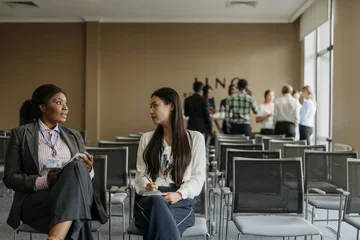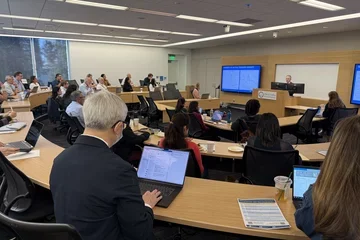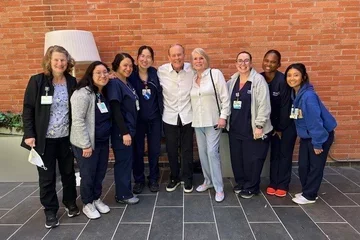Addressing racial/ethnic inequities in vaccine hesitancy and uptake

To provide outreach to the communities most impacted by COVID-19, a UCLA-led statewide coalition—with eleven academic sites and over 70 community partners—has come together to address racial/ethnic inequities, strengthen community engagement, and share lessons learned. Led by Co-Principal Investigators and CTSI Community Engagement Research Program (CERP) Co-Leads Dr. Arleen Brown and Dr. Keith Norris, this marks the first time all California CTSIs have joined efforts on a single project. Goals of the alliance include partnering with local community partners in ensuring community engagement in COVID-19 information and mitigating misinformation, ensuring inclusive and diverse recruitment in COVID-19 clinical trials, and promoting COVID-19 preventative measures, including vaccine uptake. The alliance works with incredibly diverse communities across the state, including racial/ethnic minorities, farmworkers, and veterans.
A new publication describes some of this work and potential public implications, including how the research team initially focused on increasing awareness of and participation in vaccine and therapeutic clinical trials before addressing vaccine hesitancy and confidence once vaccines became available. The paper also describes how the team worked to address barriers that communities have faced in accessing COVID-19 information and resources, including vaccines and PPE.
“Recommendations are also listed for what researchers and the community can do moving forward so that we’re better prepared for the next emergency, and even to address current inequities in health care,” said Dr. Mona AuYoung, first author on the paper and assistant adjunct professor in the division of general internal medicine and health services research at UCLA.
Coming to these recommendations came through significant coordination. The team held focus groups did phone outreach in-person events, and spread the word to key populations through multiple media channels, to name a few. This builds on previous CEAL-funded UCLA research, exploring public health implications from multi-ethnic community member perspectives on barriers and gaps in COVID-19 vaccine communications and accessibility.
AuYoung, a co-leader of CERP at CTSI, shared that the team is only getting started.
“We hope to sustain our current network and the relationships that have been built to continue addressing COVID, but we also plan to address other emerging concerns like mental health and expand our work with community health workers, community liaisons, and others that have been dedicated to supporting under-resourced communities.”
Dr. Alejandra Casillas, a co-author on the paper and assistant professor-in-residence of medicine at UCLA with CTSI roles as a CERP investigator and co-lead of the TL1 Program, will also soon publish a paper that evaluates the UCLA-led network and how it could potentially serve as a model for future work.
Additional UCLA CTSI leadership that serve as co-authors include Audrey Kawaiopua Alo and Paris Adkins-Jackson. UCLA CTSI personnel from the CERP program that contributed as Communications Working Group members include: Savanna Carson, Gloria Kim, Stefanie Vassar, Etsemaye Agonafer, Juan Barron, Sarmen Hakopian, and Ejiro Ntekume.
This research was supported by NIH CEAL/STOP COVID-19 CA grant # 21-312-0217571-66106L (UCLA serves as the lead) and CERP co-authors were supported by UL1TR001881.
Read the full paper to learn more.
image caption: STOP COVID-19 is a UCLA-led statewide coalition with eleven academic sites and over 70 community partners. Academic sites include UC Los Angeles, UC Davis, UC Irvine, UC San Diego, UC San Francisco, Scripps Health, Stanford University, USC, three RCMI-eligible institutions, UC Riverside, UC Merced and San Diego State University.
Image source:



